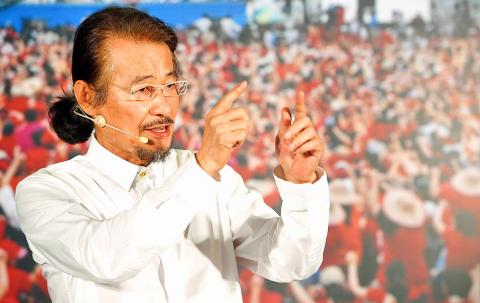Long-time political activist Shih Ming-te (施明德) yesterday announced his presidential bid, saying that he aimed to bring about cross-strait reconciliation and implement social justice, while lashing out at “conventional” politicians who he said had betrayed the public.
“In each successive administration, we see politicians betraying their ideologies, tearing the nation apart and losing direction,” Shih, a founding member of the Democratic Progressive Party (DPP), who broke ties with the party in 2000, told a news conference in Taipei yesterday morning. “There is no leadership in Taiwan, just decisions based on the interaction of power and interests, and the public no longer has any expectations of a new dawn.”
“Along the path of revolution, I have made narrow escapes from the dictator’s knife, and eventually, I knew I would have to engage in a duel with these dirty politicians,” Shih said.

Photo: Wang Min-wei, Taipei Times
He promised that, once elected, he would work to bring about reconciliation between the nation’s political parties, as well as between Taiwan and China; he also vowed to realize social justice and put an immediate end to government corruption.
He called for both the Republic of China (ROC) and the People’s Republic of China (PRC) to work together to form a political entity under what he described as a “larger one China” framework, adding that developments in the cross-strait relationship should be based on the reality that the ROC and the PRC are separate political entities.
“The definition of ‘one China’ has been made too narrow, and in reality it is just taken to mean the PRC,” Shih said. “This is something that the 23 million people of the ROC cannot accept, and I propose to replace it with the ‘larger one China’ framework to bring about reconciliation.”
Under the “larger one China” framework, Shih said, the ROC and the PRC would cease being rivals, and would promise not to take military action against each other, while each side would enjoy the right to take part in international organizations and to establish diplomatic ties with other nations.
Shih said he would assign posts in the central government and the state-run businesses to candidates from the Chinese Nationalist Party (KMT), the Democratic Progressive Party, elites and people under 39.
“My idea is to put an end to the one-party regime or one-party presidential system, and make the president a truly national president,” Shih said.
He went on to say that he would also seek to modernize the legal system in Taiwan, as most of the laws framed in China by the KMT regime 70 years ago.
However, Shih said that it could take a long time to reform the laws, therefore, he proposed creating legal reform committees overseen by the president, with the participation of progressive civic groups.
“When we have finished the law amendment proposals, we would bypass the malicious Legislative Yuan and put the proposals to direct referendums to allow the public to decide whether to put them into effect,” Shih said.
He said he deliberately picked yesterday to announce his presidential bid because it marked the date on which he was released from prison for the last time 25 years ago.

An essay competition jointly organized by a local writing society and a publisher affiliated with the Chinese Communist Party (CCP) might have contravened the Act Governing Relations Between the People of the Taiwan Area and the Mainland Area (臺灣地區與大陸地區人民關係條例), the Mainland Affairs Council (MAC) said on Thursday. “In this case, the partner organization is clearly an agency under the CCP’s Fujian Provincial Committee,” MAC Deputy Minister and spokesperson Liang Wen-chieh (梁文傑) said at a news briefing in Taipei. “It also involves bringing Taiwanese students to China with all-expenses-paid arrangements to attend award ceremonies and camps,” Liang said. Those two “characteristics” are typically sufficient

A magnitude 5.9 earthquake that struck about 33km off the coast of Hualien City was the "main shock" in a series of quakes in the area, with aftershocks expected over the next three days, the Central Weather Administration (CWA) said yesterday. Prior to the magnitude 5.9 quake shaking most of Taiwan at 6:53pm yesterday, six other earthquakes stronger than a magnitude of 4, starting with a magnitude 5.5 quake at 6:09pm, occurred in the area. CWA Seismological Center Director Wu Chien-fu (吳健富) confirmed that the quakes were all part of the same series and that the magnitude 5.5 temblor was

The brilliant blue waters, thick foliage and bucolic atmosphere on this seemingly idyllic archipelago deep in the Pacific Ocean belie the key role it now plays in a titanic geopolitical struggle. Palau is again on the front line as China, and the US and its allies prepare their forces in an intensifying contest for control over the Asia-Pacific region. The democratic nation of just 17,000 people hosts US-controlled airstrips and soon-to-be-completed radar installations that the US military describes as “critical” to monitoring vast swathes of water and airspace. It is also a key piece of the second island chain, a string of

The Central Weather Administration has issued a heat alert for southeastern Taiwan, warning of temperatures as high as 36°C today, while alerting some coastal areas of strong winds later in the day. Kaohsiung’s Neimen District (內門) and Pingtung County’s Neipu Township (內埔) are under an orange heat alert, which warns of temperatures as high as 36°C for three consecutive days, the CWA said, citing southwest winds. The heat would also extend to Tainan’s Nansi (楠西) and Yujing (玉井) districts, as well as Pingtung’s Gaoshu (高樹), Yanpu (鹽埔) and Majia (瑪家) townships, it said, forecasting highs of up to 36°C in those areas